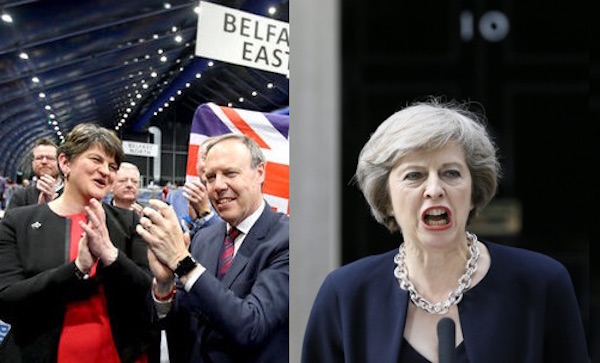
Sinn Fein has played down the impact of a deal between unionists and Conservatives as it emerged the Democratic Unionist Party will support a minority Tory government in London.
Following Thursday’s snap general election called by Theresa May last month, the Conservatives lack a majority at Westminster, and are seven seats short. The DUP was returned with ten seats and talks are underway between the two parties.
In a catastrophic result for the Tories, May threw away a clear parliamentary majority, while Labour under Jeremy Corbyn won increased support, gaining 32 seats amid a huge turnout by younger voters.
Sinn Fein’s Northern leader, Michelle O’Neill said it was no surprise that the DUP was siding with the Conservatives, and suggested it wouldn’t last long.
“Experience shows that unionists have minimal influence on any British government be that on Major, Thatcher or Theresa May,” she said. “They have achieved little propping up Tory governments in the past and put their own interests before those of the people.”
History shows that “alliances between Ulster unionism and British unionism have always ended in tears,” Sinn Fein president Gerry Adams added.
Sinn Fein’s policy of not taking its seats in the Westminster parliament, which involves making an oath of allegiance to the English queen, eases pressure on the Tory/DUP alliance by increasing its working majority from five to 12 seats.
However, voters had endorsed it, Ms O’Neill said: “Nationalist opinion is looking to leadership at home and across Ireland, not Britain.”
Amid political uncertainty in London, Theresa May’s initial statements and actions suggested a leader who is in denial over the public’s failure to give her the support she had sought.
“What the country needs more than ever is certainty, and having secured the largest number of votes and the greatest number of seats in the general election, it is clear that only the Conservative and Unionist Party has the legitimacy and ability to provide that certainty by commanding a majority in the House of Commons,” she said outside Downing Street, following a brief visit to Buckingham Palace.
“As we do, we will continue to work with our friends and allies in the Democratic Unionist Party in particular. Our two parties have enjoyed a strong relationship over many years, and this gives me the confidence to believe that we will be able to work together in the interests of the whole United Kingdom.”
Despite her bravado, a sense of failure hangs over the British Prime Minister. A number of Conservative MPs have suggested she should resign. Conservative member of parliament Anna Soubry was the first in the party to disavow May in public, calling on the prime minister to “consider her position”.
The Democratic Unionist leader, Arlene Foster, believes her party is in a strong position. She said she was entering talks with the Conservative Party “to explore how it may be possible to bring stability to our nation at this time of great challenge”.
In a scripted statement, she pointed to the increase in her own party’s vote, while ignoring an overall decline in unionist support.
Refusing to take questions, the DUP leader said the election outcome was a “great result for the Union. Not just here in Northern Ireland but right across our United Kingdom.
“Those who want to tear apart the Union that we cherish and benefit from so hugely have been sent a clear and resounding message. In the days and weeks ahead, it is that Union that will be to the forefront of our minds.”
Ms Foster reportedly spoke to Ms May before the prime minister met the English queen on Friday morning to request permission to form a new government. Ms May and Ms Foster came to a temporary understanding during that conversation.
It is understood the two parties had not yet made any deal but that more formal talks will begin next week. A list of demands is being formulated that the DUP will seek before supporting the Tories in a minority government.
On Brexit, the party has expressed a preference for a hard border to reinforce the partition of Ireland, rather than EU special status with increased checks at air and seaports.
It is also likely to make demands in support of sectarian parades, immunity for British war criminals, and the shelving of an inquiry into the RHI corruption scandal.
Almost 300,000 have already signed a petition against the move. The DUP’s fundamentalism, homophobia, racism, links to paramilitaries and history of financial scandals are among the concerns of the British public.
Former Labour spin doctor Alastair Campbell also noted that Ms May was directly threatening the peace process.
Speaking on the BBC, he said: “She is putting that at risk with a sordid, dangerous distasteful deal.
“We have a situation in the Northern Ireland right now where there has been a political crisis where the Government is the mediator with the Irish government between the DUP and Sinn Fein.
“How can our government be the mediator when the DUP are going to be part of our government?”
![[Irish Republican News]](https://republican-news.org/graphics/title_gifs/rn.gif)
![[Irish Republican News]](https://republican-news.org/graphics/title_gifs/harp.gif)

